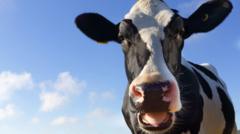Did the Controversial Methane-Cutting Cow Feed Trial Succeed?

Published: 2025-11-08 16:00:22 | Category: technology
The recent trial of Bovaer, a feed additive aimed at reducing methane emissions from dairy cows, has concluded, leaving UK dairy co-operative Arla Foods to evaluate the results across 30 farms. The additive, designed to suppress methane production in cows, has faced scrutiny over food safety and potential health impacts, particularly amid rising concerns in Denmark. While the manufacturer, DSM-Firmenich, insists on its safety and effectiveness, the future of Bovaer in the UK remains uncertain as the industry weighs environmental benefits against animal welfare implications.
Last updated: 27 October 2023 (BST)
What’s happening now
The trial of Bovaer, which began in 2022, has recently concluded, with Arla Foods now analysing the data collected from participating farms. The additive has been touted for its potential to reduce methane emissions by 30-45%, but the controversy surrounding its use is growing. In Denmark, where Bovaer is mandated for use on many dairy farms, reports of cow health issues have surfaced, prompting investigations by local authorities. As UK regulators have deemed Bovaer safe at approved doses, the decision on its broader application in the UK will hinge on the findings of Arla's review.
Key takeaways
- The trial of Bovaer has ended, with Arla Foods reviewing results from 30 farms.
- Concerns regarding food safety and cow health have emerged, particularly in Denmark.
- DSM-Firmenich asserts Bovaer is safe and effective, already used in over 25 countries.
Timeline: how we got here
The development and trials of Bovaer have unfolded over recent years, marked by significant milestones:
- 2022: Bovaer trial launched in the UK involving 30 dairy farms.
- 2023: UK Food Standards Agency safety assessment confirms no safety concerns at approved doses.
- Ongoing: Reports of cow illnesses in Denmark lead to investigations and monitoring by authorities.
What’s new vs what’s known
New today/this week
As of late October 2023, the focus is on the results of the Bovaer trial in the UK and the ongoing scrutiny in Denmark regarding health concerns among cows. Arla Foods has yet to make a decision about the future use of the additive based on the trial data.
What was already established
Bovaer, known scientifically as 3-Nitrooxypropanol, has been in use for over three years in various countries, reportedly reducing methane emissions significantly. However, its introduction to the UK market has been met with scepticism due to concerns regarding animal welfare and misinformation circulating online.
Impact for the UK
Consumers and households
The potential use of Bovaer may influence dairy prices and availability in the UK. If successful, it could lead to a more environmentally friendly dairy industry, appealing to consumers increasingly concerned about climate change. However, the safety and health of dairy cows will remain a priority for consumers.
Businesses and jobs
For dairy farmers, the adoption of Bovaer could enhance sustainability efforts and potentially open new markets focused on eco-friendly practices. However, the uncertainty around animal health impacts could deter some farmers from adopting the additive, affecting overall industry dynamics.
Policy and regulation
UK regulators have approved Bovaer for use, but the ongoing investigations in Denmark may prompt UK authorities to review their stance. The National Farmers’ Union (NFU) has emphasised the need for rigorous evaluation of any new products to ensure animal welfare remains a top priority.
Numbers that matter
- 30-45%: Estimated reduction in methane emissions from cows when using Bovaer.
- 1,400 out of 2,000: Number of Danish dairy farms currently using Bovaer under government mandate.
- 3 years: Duration Bovaer has reportedly been in use internationally, with thousands of farmers employing it.
- 28 times: Methane's potency compared to carbon dioxide over a 100-year period.
Definitions and jargon buster
- Bovaer: A feed additive designed to reduce methane emissions from dairy cows.
- Methane: A potent greenhouse gas, significantly more effective at trapping heat in the atmosphere than carbon dioxide.
- 3-Nitrooxypropanol: The scientific name for Bovaer, which works by inhibiting enzymes that produce methane in cows' stomachs.
How to think about the next steps
Near term (0–4 weeks)
In the coming weeks, Arla Foods will finalise its review of the trial results. Stakeholders in the dairy industry will be keenly awaiting the outcomes to gauge the future of Bovaer in UK agriculture.
Medium term (1–6 months)
As investigations in Denmark continue, the UK may see a shift in regulatory approaches depending on emerging findings regarding the safety and efficacy of Bovaer. Farmers may need to prepare for potential changes in recommendations or requirements for methane-reducing products.
Signals to watch
- Results from Arla Foods regarding the Bovaer trial.
- Updates from Danish authorities regarding health investigations linked to the additive.
- Reactions from the National Farmers’ Union regarding the ongoing situation.
Practical guidance
Do
- Stay informed about the trial results and any emerging research on Bovaer.
- Engage with agricultural bodies to understand implications for dairy farming practices.
Don’t
- Ignore health concerns raised by farmers regarding Bovaer; monitor developments closely.
- Assume Bovaer will be widely adopted without considering ongoing safety evaluations.
Checklist
- Review safety assessments from regulatory bodies on Bovaer.
- Engage with local farming communities to discuss experiences with the additive.
- Monitor news for updates on the health investigations in Denmark.
- Evaluate the environmental impact of using Bovaer against potential health risks.
Risks, caveats, and uncertainties
As the situation develops, it is crucial to acknowledge the uncertainties surrounding Bovaer. The investigations in Denmark may yield findings that could influence perceptions of the additive's safety. Additionally, misinformation and public sentiment can shift rapidly, which could affect consumer behaviour and industry standards.
Bottom line
The conclusion of the Bovaer trial marks a pivotal moment for the dairy industry in the UK, with significant implications for environmental sustainability and animal welfare. As stakeholders await the trial results and observe developments in Denmark, the future of this methane-reducing additive remains in flux, necessitating careful consideration by farmers, regulators, and consumers alike.
FAQs
What is Bovaer and how does it work?
Bovaer is a feed additive designed to reduce methane emissions from dairy cows by suppressing the enzymes in their stomachs that produce the gas, with claims of reducing emissions by 30-45%.
Is Bovaer safe for cows and humans?
While UK regulators have approved Bovaer and deemed it safe for use, ongoing investigations in Denmark regarding cow health are raising questions that may influence its status in the future.
What are the environmental benefits of using Bovaer?
Utilising Bovaer could significantly lower methane emissions from dairy cows, contributing to climate change mitigation efforts and promoting more sustainable agricultural practices.



